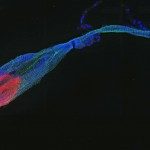Link to Pubmed [PMID] – 17961215
Malar. J. 2007;6:140
BACKGROUND: Malaria diagnosis is vital to efficient control programmes and the recent advent of malaria rapid diagnostic tests (RDTs) provides a reliable and simple diagnostic method. However a characterization of the efficiency of these tests and the proteins they detect is needed to maximize RDT sensitivity.
METHODS: Plasmodial lactate dehydrogenase (pLDH) gene of wild isolates of the four human species of Plasmodium from a variety of malaria endemic settings were sequenced and analysed.
RESULTS: No variation in nucleotide was found within Plasmodium falciparum, synonymous mutations were found for Plasmodium malariae and Plasmodium. vivax; and three different types of amino acid sequence were found for Plasmodium ovale. Conserved and variable regions were identified within each species.
CONCLUSION: The results indicate that antigen variability is unlikely to explain variability in performance of RDTs detecting pLDH from cases of P. falciparum, P. vivax or P. malariae malaria, but may contribute to poor detection of P. ovale.
